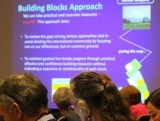Roundtable held at the United Nations on 22 October 2014 co-sponsored by the Global Security Institute and the Permanent Missions of Japan and the Netherlands to the UN
On October 22, 2014, on the sidelines of the General Assembly First Committee deliberations at the United Nations Headquarters in New York, the Permanent Missions of Japan and the Netherlands and the Global Security Institute (GSI) hosted a roundtable discussion on the Building Blocks Approach for a World Without Nuclear Weapons.
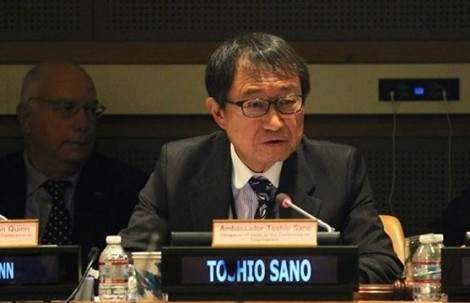
Ambassador Sano (Japan) chairs the event
Ambassador Toshio Sano from the Delegation of Japan to the Conference on Disarmament, chaired the event. Panelists included disarmament leaders in the diplomatic corps and civil society, including: Mr. Jonathan Granoff, Global Security Institute; Mr. Hiro Yamamoto, Delegation of Japan to the CD; Mr. Theo Peters, Ministry of Foreign Affairs of the Netherlands; Mr. Alyn Ware, Parliamentarians for Nuclear Non-Proliferation and Disarmament; Dr. John Burroughs, Lawyers Committee on Nuclear Policy; and Ambassador John Quinn, Delegation of Australia to the CD.
The roundtable focused on proposals in the working paper Building Blocks for a World without Nuclear Weapons submitted by Japan and other countries to the UN Open Ended Working Group on Taking Forward Multilateral Nuclear Disarmament Negotiations, and a Middle Powers Initiative (MPI) brief entitled Beacon of Hope.
It also follows on from roundtables organised by Parliamentarians for Nuclear Nonproliferation and Disarmament and MPI in Geneva August 2013 and September 2014 and in Berlin February 2013 as part of the Framework Forum, a joint initiative with the Basel Peace Office and Global Security Institute.
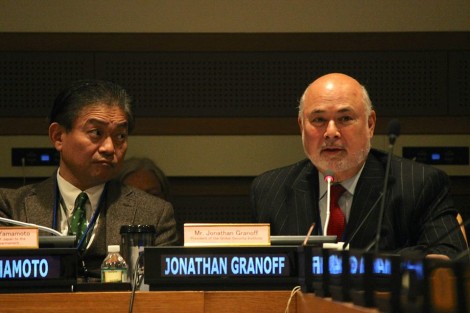
Mr Yamamoto (Japan) and Jonathan Granoff (GSI)
The panelists discussed which kinds of building blocks should be pursued to advance progress toward a world free of nuclear weapons, and in which forums those measures might be undertaken most effectively. At the core of the Building Blocks proposal, as emphasized by all panelists, is the rejection of ‘sequentialism’, i.e. that we can only work on nuclear disarmament measures one-after-the other. Rather, the only way to ensure progress and overcome the current barriers to progress is to work simultaneously on a range of disarmament measures in multiple forums using a variety of approaches.
Mr. Hiro Yamamoto outlined examples of the disarmament measures in the “building blocks” paper, including measures to be pursued by nuclear weapons states and non-nuclear weapon states alike. The non-exhaustive list included, among other things, universalization of the NPT, entry-into-force of the CTBT, negotiation of a fissile material cut-off treaty, reducing the role of nuclear weapons in security doctrines, increasing transparency of and de-alerting nuclear forces, and arsenal reductions.
“With the Building Blocks approach we can take practical and concrete measures in parallel . . . to narrow the gaps among various approaches and to avoid dividing the international community by focusing not on our differences, but on common ground.”Mr. Hiro Yamamato

Mount Fuji
Yamamoto likened the path to a nuclear-weapon-free world as being like climbing Mount Fuji – which has multiple paths to the top all supported by well-built steps and supporting measures.
Mr. Alyn Ware critiqued the Building Blocks proposal by first highlighting five promising aspects. On the positive side, Mr. Ware noted that the paper focused on concurrent measures (as opposed to step-by-step), universalizing existing measures, negotiating both near-term and mid-term measures, exploring the idea of having a Nuclear Weapons Convention or a Framework of Agreements, and working on a combination of unilateral, bilateral, pluri-lateral and multi-lateral measures.
“We used to say that getting to a nuclear-weapon-free world was like climbing Mount Everest – a long and technically difficult climb that will take good planning and many steps. Indeed, from where we stand now, the top still seems covered in clouds and the path still unknown. However, the analogy of climbing Mount Fuji is probably more accurate, with many of the steps already in place, a range of paths to the top and the possibility for everyone to get there.”Mr. Alyn Ware
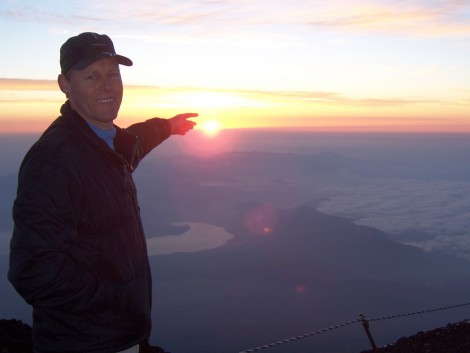
Mr Ware on top of Mount Fuji
Mr. Ware then offered three challenges to the Building Blocks approach. He noted that it would continue to be difficult, if not impossible, to achieve the near-term measures outlined in the proposal unless measures to reduce the role of nuclear weapons were strengthened and brought into play earlier in the process. This should include a universal prohibition on use, possibly preceded by the adoption of no-first-use or sole-purpose doctrines. Mr Ware also indicated that an over-reliance on the Conference on Disarmament has prevented progress, and more attention should be given to advancing parallel nuclear disarmament initiatives in the UN General Assembly, Security Council, International Criminal Court and through a revived Open Ended Working Group.
Finally, Mr Ware recommended that the proposal give more attention to the early exploration and development of the framework for comprehensive nuclear disarmament under a framework convention or nuclear weapons convention. He noted that in order to build a house, there needs to be a good architectural plan for the house to ensure that the foundation and framework can support the roof, walls and final components.
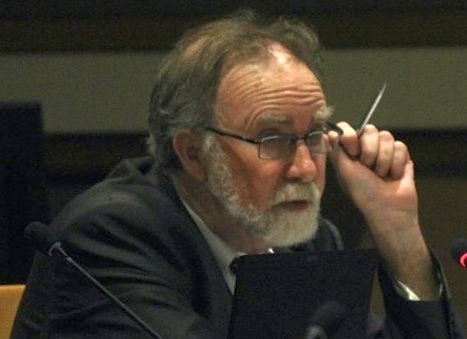
Mr Burroughs
Dr. John Burroughs began by urging an understanding of one type of “building blocks” as elements or pillars of the architecture of a permanent world free of nuclear weapons. These “pillars,” he said, are measures like a prohibition of testing, a prohibition of production of fissile materials for nuclear weapons and a prohibition of use of nuclear weapons in any circumstance. They are distinct from measures such as reduction of numbers and role of nuclear weapons that lead toward a nuclear weapons-free world.
“Sequentialism should be completely rejected. It is highly counterproductive to assume that plurilateral or multilateral negotiations on reduction and elimination of arsenals, or on a prohibition of use, or on governance of a nuclear weapons free world, must await conclusion of negotiations of a fissile materials treaty.”Dr. John Burroughs
Mr. Jonathan Granoff expressed profound disappointment with the lack of political will demonstrated during the general debates in this year’s General Assembly, when he pointed out that not one head of government or state mentioned therein what he argues to be the highest cost of nuclear weapons: the opportunity cost.
“For us to deal with the actual threats that we are beginning to recognize, which are global and which require global cooperation – protecting the commons, the oceans, the climate, the rainforest, controlling pandemic diseases – to deal with any of these . . . we need to have a different definition of security. The opportunity costs of living in a nuclear apartheid world are extremely high. Nuclear weapons create a wall where bridges of cooperation are required.Mr. Jonathan Granoff
Granoff concluded by stating that unless a few countries show willingness to step forward and begin the preliminary process of demonstrating their commitment to nuclear weapons elimination – which would entail plans to commence negotiations on a ban, a convention, a framework or some other approach – that it’s unlikely we will be able to change the status quo in the near future.
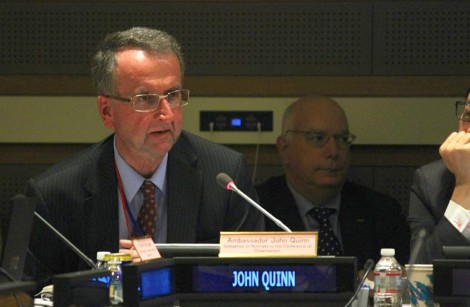
Ambassador Quinn
Ambassador John Quinn, speaking on behalf of the Australian delegation to the CD, began by identifying a dimension which he felt hadn’t been sufficiently addressed up until that point by the panelists: that of security. Quinn highlighted the importance in acknowledging the fact that the strategic environment in which we operate is replete with complexities – adding that this acknowledgment should not, however, lower the level of initiative and enthusiasm – but that it should allow for consideration of more practical proposals which can realistically be achieved.
Striking a similar chord, Mr. Theo Peters noted that the ultimate goal of the elimination of the 17,000 nuclear weapons currently in existence from the regional security environment will have consequences in terms of what it means for security, and that in order to reach a truly durable solution, we must find ways to address the security situations which give role to nuclear weapons in the first place.
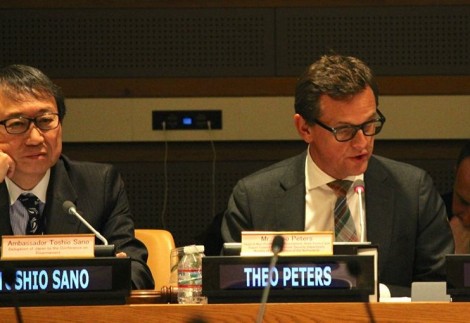
Mr Theo Peters
Key questions and comments in the discussion period concerned whether the renunciation of extended nuclear deterrence relationships would be included in the list of building blocks, and what is the relationship of the building blocks proposal to the proposal for a like-minded treaty banning possession of nuclear weapons (sometimes called a ban treaty).
Mr. Granoff responded that nuclear deterrence is part of the larger pursuit of “strategic stability” which is never truly stable, cannot be measured, and is very dangerous. 'Moreover, it rests on reciprocal terror and relies on an unrealistic confidence in the infallibility of people and machines,' he said. 'Indeed, security will only be obtained by approaches that address real threats that require cooperation. We can no longer rely on the old Roman maxim: Prepare for war receive peace; prepare for peace receive war.'
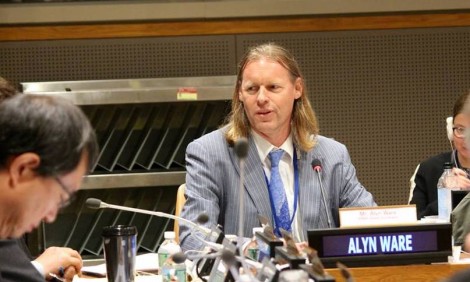
Mr Ware
Mr. Ware responded by noting that a number of countries had renounced the reliance on nuclear deterrence, and that it is vital for others to take the same step. He supported the informal proposal made to the OEWG by the Netherlands and New Zealand for a study on the specific scenarios in which governments ascribe a security or military role to nuclear weapons, and on whether there are better alternatives, in order to eliminate the role of nuclear weapons.
Mr. Ware also noted that a use-ban and/or a possession ban could indeed be one of the building blocks toward a universal agreement on complete nuclear disarmament. Indeed, the initiatives could be complementary and mutually reinforcing.
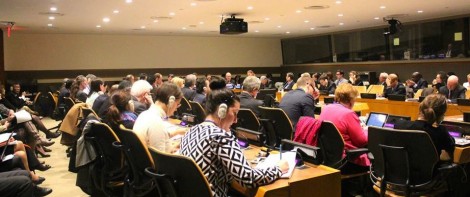
Participants at the Building Blocks roundtable event
Ambassador Quinn concluded the event by emphasizing that the Building Blocks approach was a constructive and practical attempt to bridge the differences between the nuclear and non-nuclear States and between different approaches in order to advance nuclear disarmament through simultaneous work on a range of ‘building blocks’ that could be agreed and construction started.
*********************************************************************
- Photo gallery of the Building Blocks roundtable discussion.
- PDF version of the report on the Building Blocks roundtable discussion
Basel Peace Office, PNND, MPI and GSI thank the Friedrich Ebert Foundation and Rissho Kosei-kai (Donate-a-Meal Fund for Peace) for their support for the Framework Forum
